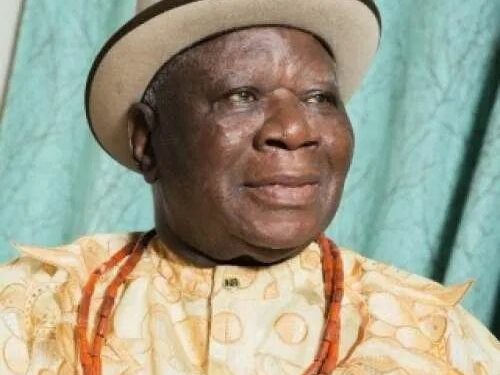The Pan Niger Delta Forum (PANDEF) convener, Chief Edwin Clark, has counseled President Bola Tinubu to propose a constitutional amendment that would bar non-Niger Delta States like Imo, Ondo, and Abia from participating in the Niger Delta Development Commission (NDDC). This is part of the Presidential Amnesty Program.
Additionally, he argued that the government should create a distinct platform for the hinterland states since it is becoming increasingly evident that these states are oil-bearing.
Leading figures from the South-South region noted during a press conference held at his Abuja home on Tuesday that the inclusion of states that are not technically part of the Niger Delta in the commission was an anomaly in the first place.
Speaking about the process that resulted in the NDDC Act being passed, Clark recalled that former President Olusegun had influenced it because he believed it was the only way to secure enough votes in the National Assembly to pass the bill. He also recalled that opposition to the bill had been raised, especially from lawmakers from the north.
“The nine states’ roles and the identity of the Executive Management were delineated in the NDDC Establishment Act 2000, which was signed by Senate President Chuba Okadigbo. “It is important to remember that the inclusion of Ondo, Imo, and Abia was a political anomaly,” he said.
Noting that Cross River is no longer an oil-producing state due to Bakassi’s ceding to Cameroon, he questioned whether states like Lagos, Bauchi, Nasarawa, Kogi, and Sokoto—which are not in the Niger Delta—that are now experiencing the discovery of crude oil would now be included in the commission.
The drive to remove the current chairman by a few minority oil-producing states was criticized by the previous federal commissioner for information.
He pointed out that while Part I Section 4 of the NDDC Act stipulates that the chairman’s office shall rotate among member states, the law also stipulates that states “with the highest production quantum of oil” shall appoint managing directors and executive directors, who shall be appointed in the order of production.
“It is true that the law provided for the states to rotate the Executive positions according to the amount of production, but it did not specify which states would rotate in what order,” clarified Clark.
However, the federal government determined that, in the interest of equity, fair play, and justice, these executive positions will only alternate among the four major oil-producing states: Delta, Akwa-Ibom, Bayelsa, and Rivers States. It would be illogical and chaotic to extend this to the minority oil-producing states, such as Abia, Cross-River, Edo, Imo, and Ondo.
“For example, Imo accounts for 1.02% of the total oil production among the nine states.”
Clark outlined the issues that have recently plagued the commission and charged certain Niger Delta politicians of taking advantage of the director and executive director posts without consequence. He noted that President Tinubu has since rectified this situation.
“The administration of President Tinubu ultimately chose to rectify the situation, and a new board has been established in compliance with the NDDC Act,” he continued. I reiterate that the four main oil-producing states—Delta, Akwa-Ibom, Bayelsa, and Rivers—are the exclusive recipients of the management position, per convention and agreement.
“Because these three non-Niger Delta States—Abia, Imo, and Ondo—are demanding to hold the positions of managing director, executive director for projects, and executive director for finance, the crisis has not abated.”
He asserted that since Imo produces just more than 1% of the crude oil produced by member states, it is not within its rights to seek the expulsion of the chairman or other members appointed to the NDDC.
“At this point in time, it might be necessary to compare the amount of oil produced to a Limited Liability Company that also has majority and minority shareholders,” Clark said. A minority shareholder with less than 5% of the total shares cannot hold the position of chairman or managing director of the Limited Liability Company.
“Producing the Managing Director of the NDDC from a State that produces 1.02% will be unjust and inequitable. I am aware of Nigeria’s current status, which is to create its own minority oil-producing state at the expense of the majority of oil-producing states, which together account for more than 90% of the oil.
Therefore, Imo, which produces just 1.02% of the world’s oil, finds it irrational, inflammatory, and self-serving to demand the dismissal of the NDDC Board’s confirmed chief executives.
“The six original Niger Delta Coastal States should continue to be the NDDC. The Federal Republic of Nigeria and the oil firms should forge ties with all other states that produce oil, especially since oil has been discovered in other regions of the country, such as Bauchi, Gombe, Nasarawa, Kogi, and Lagos, where 0.9% of the country’s oil is currently produced. Thus, they are unable to participate in NDDC.

